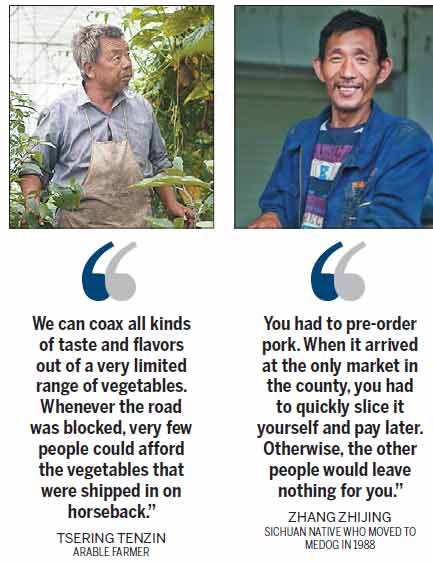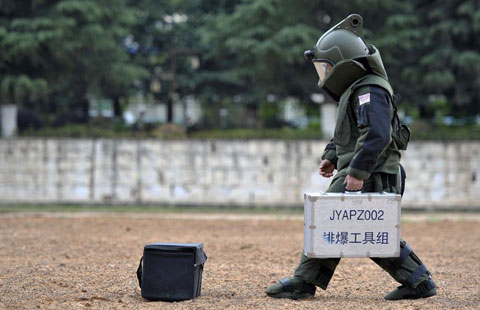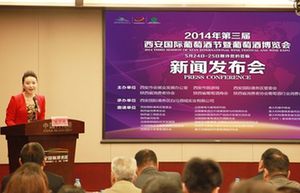County linked at last with outside world
By Wang Huazhong, Liu Xiangrui and Daqiong ( China Daily ) Updated: 2013-08-07 07:40:03In the following months, local businessmen organized porters to carry cabbages from the adjoining county, where they fetched about 1.6 yuan per kg, to sell in Medog at 26 yuan.
"Tomatoes cost 50 yuan per kg, which sounds unimaginable in inland China, but the price was reasonable at such a time and in such a place," said Tsering Tenzin.

The official records show that the local farmers and herdsmen made an average annual income of 2,623 yuan in 2008.
Even in the 1990s and early 2000s, people rushed to buy vegetables as quickly as they could and the supply of pork was even lower than in previous times of difficulty, according to butcher Zhang Zhijing, who moved to the county from Sichuan in 1988.
"You had to pre-order pork. When it arrived at the only market in the county, you had to quickly slice it yourself and pay later. Otherwise, the other people would leave nothing for you."
Medog has so few arable fields they only account for 0.08 percent of its total land.
Because the tunnel has extended the length of time during which the road is passable, large quantities of vegetables and vegetable seeds have been shipped in.
Since 2010, the local government has erected almost 100 houses made of plastic sheeting to fend off the rains and unwanted pests.
Specialists were sent to guide farmers in growing a variety of vegetables and even fruit, such as muskmelon that the locals had never seen before. "Looking at the melons growing larger, I feel delighted," said Tsering Tenzin.
Booming business
He's not the only one who has benefited from construction of the road.
Four years ago, as telecom companies exploited the accessibility provided by the road and began to initiate mobile services in the county, Duan Haiyan, 29, dug her first bucket of gold by selling obsolete mobile phones.
Two years ago, she started selling cosmetics. "Locals only used cream for protection against the winter winds in the old days. They didn't have any choice back then," she said.
In November 2010, Chen Xianxiu, 47, from Sichuan, opened Medog's first electronic appliances store and sold 300 washing machines in both 2011 and 2012.
Jikmey Dorje has developed his transport business, expanding from, literally, a one-horse operation in the 1980s to a tractor in 2000. He now owns and manages a fleet of 30 trucks.
The county government's review report described the period from 2008 to 2012 as "five years that broke the transportation shackles that had fettered the county's development".
Official figures show that the county's total road length increased from 148 km in 2008 to 263 km by 2012, including the 117-km Zhamog-Medog road.
"For generations, even in our wildest dreams we didn't dare think about having such a wonderful tunnel that went through the snow-covered mountains," said Jikmey Dorje.
"Life has improved a lot and I believe there will be even bigger changes in the future."
The upgrade is being aided by a cash injection of 3.3 billion yuan from 2011 to 2015 to consolidate and streamline the Zhamog-Medog road. The county will also invest millions of yuan to build roads to link county seats and villages.
Opening minds
| More high-resolution photos related to the story |
"Before, few people wished to work outside or send their children to school. But, the mindset has changed along with the road. People know that Medog has lagged behind and we won't catch up if we don't study."
The 30-year-old local graduated from the University of Tibet in 2005 and returned to Medog the same year.
Twenty years ago, the local primary school taught students for three years. Following that, aged about 8, the children had to leave their families and walk for four days to study at schools in the neighboring counties of Nyingchi prefecture.
"My first experience outside was overwhelming. There's a lot of good food out there; I like dumplings the most because I'd never tried them in Medog. You couldn't buy things, even a stick of gum, in Medog back then. It was practically empty and there wasn't even a shop," said Padma Dradul.
He said that because so few locals had ventured far from Medog their knowledge of the outside world was limited and that made them reluctant to send their children to school.
Since then, Medog has acquired the road and TV, and mobile phones allow the residents to access the Internet. All this has led members of the younger generation, such as Padma Dradul, to ask: "How can we bring change to Medog?"
"People used to think, 'I have my piece of land, so I won't starve if I keep working the farm', but now, they've seen the developments and have realized they can't keep living on subsidies," he said.
Although Dexing is self-sufficient in agricultural output, Padma Dradul is not satisfied that most of the village's income is based on manual labor. "Selling labor is not sustainable. We must move up the value chain," he said.
To that end, he took 29 villagers to Sichuan province in 2012 so they could learn the art of bamboo weaving, "It has high added value. We now plan to combine our ethnic influences with our weaving expertise and expand the business to a wider market. The road will lead our development."
Contact the writers at wanghuazhong@chinadaily.com.cn and daqiong@chinadaily.com.cn
|
|
|
|
|
|
|
|


















 Op Rana
Op Rana Berlin Fang
Berlin Fang Zhu Yuan
Zhu Yuan Huang Xiangyang
Huang Xiangyang Chen Weihua
Chen Weihua Liu Shinan
Liu Shinan